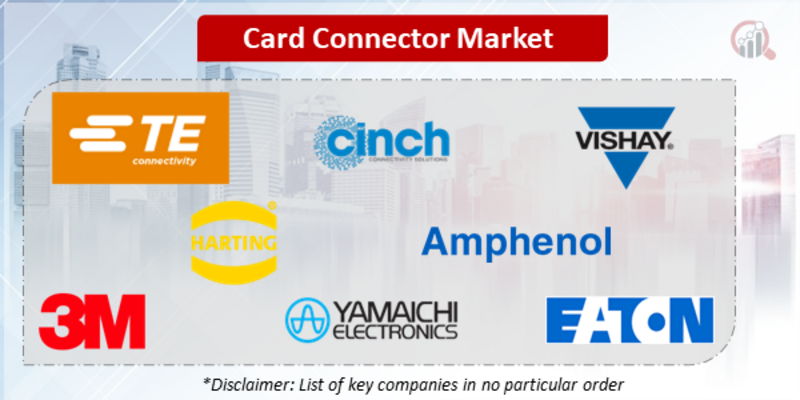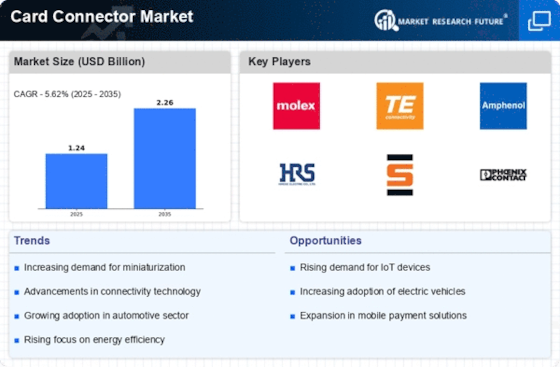Top Industry Leaders in the Card Connector Market

The Competitive Landscape of the Card Connector Market
In the realm of electronics, the seemingly small card connector plays a pivotal role, the silent hero ensuring seamless flow of power and data within a myriad of devices. The Card Connector market hums with the quiet activity of diverse players vying to provide the critical link between cards and electronic circuits. Understanding the strategies at play, the factors driving market share, and the rising stars reshaping the industry is crucial for anyone navigating this interconnected landscape. Driven by factors like increasing demand for electronic devices, miniaturization trends, and expanding applications in diverse industries, the market is expected to exhibit sustained growth in the coming years.
Key Player:
- TE Connectivity Ltd.
- Cinch Connectivity Solutions
- Vishay Inter Technology, Inc.
- HARTING Technology Group
- Ymaichi Electronics Co., Ltd.
- Amphenol Corporation
- Kycon, Inc.
- Eaton Corporation Plc
- CW Industries
- Hirose Electric Co., Ltd.
Strategies Adopted by Market Leaders:
-
Technological Innovation: Industry giants like TE Connectivity, Molex, and Amphenol invest heavily in R&D, pushing the boundaries of card connector technology. Miniaturization, high-speed data transmission capabilities, and increased durability are hallmarks of their efforts. -
Focus on Diversification: Leading players offer a vast array of connector types catering to diverse applications, from low-profile for mobile devices to ruggedized for harsh environments, ensuring market reach across various industries. -
Material Optimization: Established companies explore advanced materials like high-performance plastics and alloys to balance cost, performance, and sustainability, aligning with environmental concerns. -
Automated Manufacturing and Quality Control: Implementing stringent quality control measures and investing in automated assembly processes ensure consistent performance and reliability, critical for device manufacturers.
Factors for Market Share Analysis:
-
Performance and Reliability: Consistent connection, efficient data transmission, and resistance to environmental wear and tear are essential for device functionality. Companies offering the most reliable and robust connectors gain an edge. -
Miniaturization and Cost-Effectiveness: Balancing high performance with compact designs and competitive pricing is crucial, particularly in consumer electronics and space-constrained applications. -
Compliance with Regulations: Adherence to industry standards and stringent safety certifications for specific use cases like medical devices or hazardous environments is paramount for market access. -
Customization and Design Flexibility: Offering custom connector designs and adapting to specific technical requirements of devices differentiate platforms and attract niche market segments.
New and Emerging Companies:
The market is witnessing a surge of innovative startups offering niche solutions. Würth Elektronik, for example, specializes in high-frequency connectors for advanced communications and data transmission applications. Another player, Hirose Electric, focuses on miniaturized and low-profile connectors ideal for wearable devices and compact electronics. Additionally, companies like FCI and Molex Connectors offer biocompatible and sterile connectors tailored for medical equipment and implantable devices.
Industry Developments:
- Nov 2023, TE Connectivity: Launched the MicroQuik Micro USB connector with enhanced durability and miniaturization for wearables and other compact devices.
- Oct 2023, Amphenol Corporation: Introduced a new line of ruggedized card connectors for harsh environments in industrial and automotive applications.










